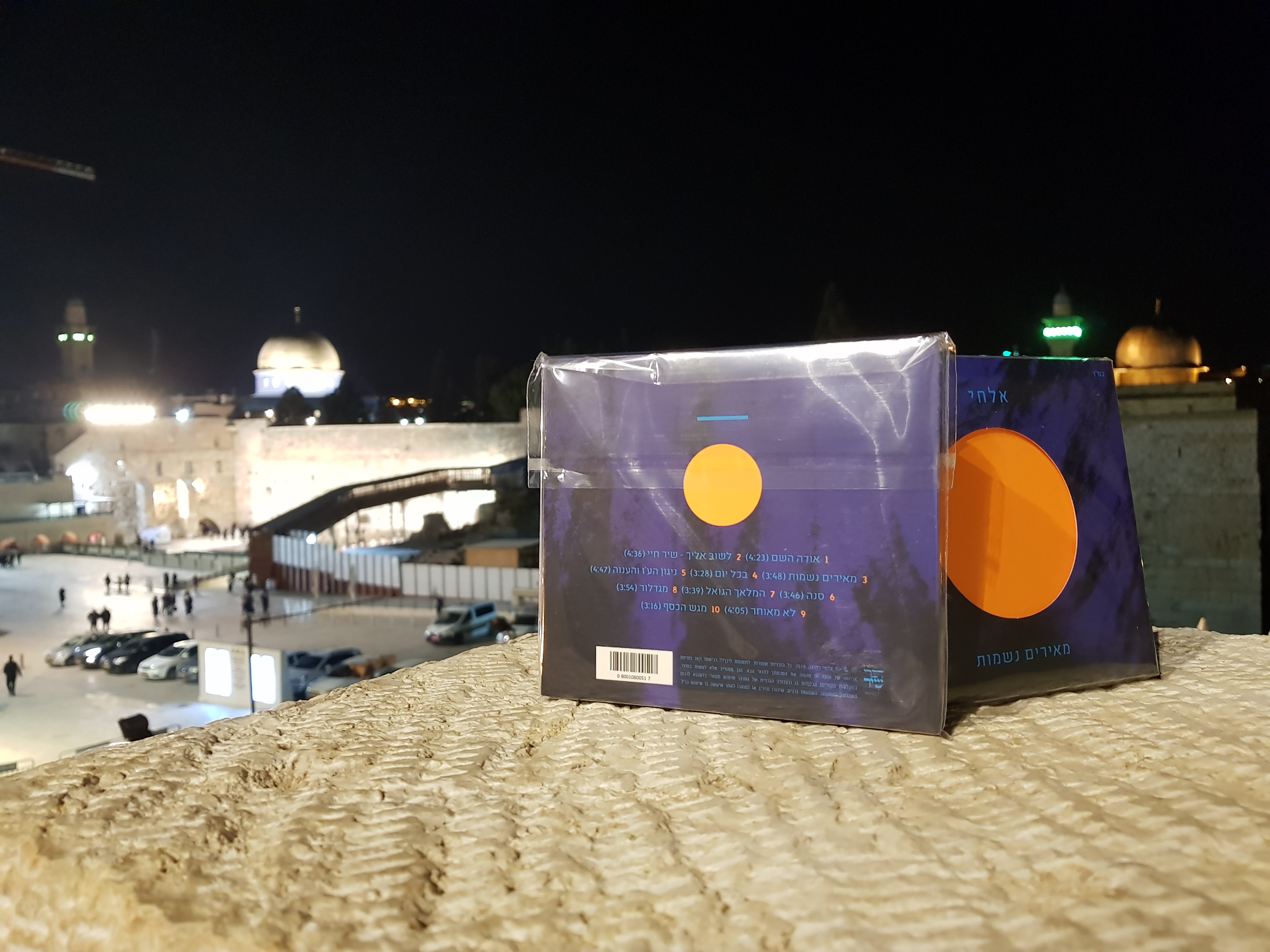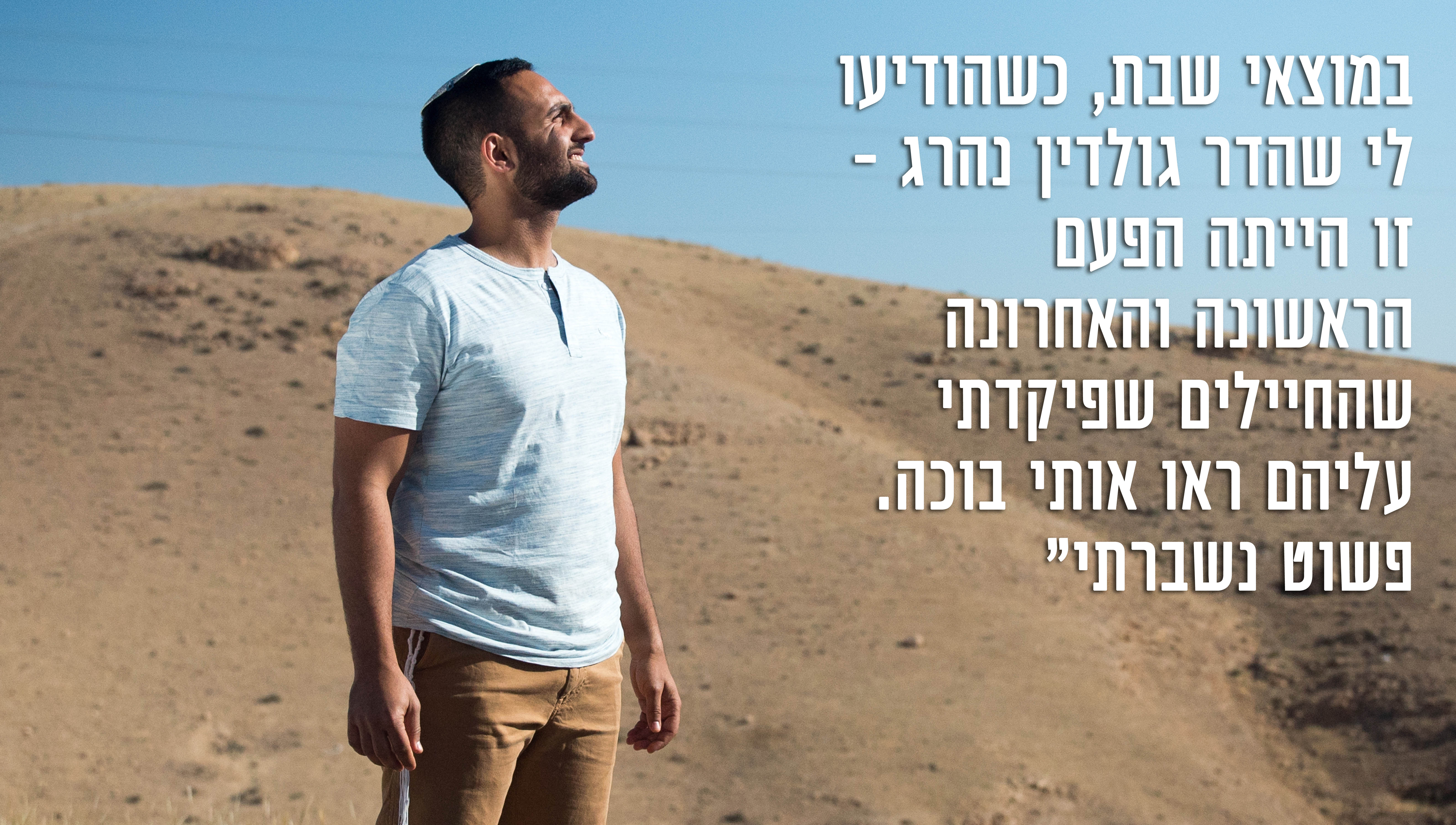Elchai Refuah Embarks on a New Path and Admits: "I Tried to Introduce Religious Content to 'Kochav Nolad'"
After rising to fame on 'Kochav Nolad', significant spiritual growth, dealing with late bachelorhood, and a painful farewell to his close friend Hadar Goldin z"l, Elchai Refuah releases a debut album and reveals why his picture isn't on the cover.
 Elchai Refuah (Photo: Yonatan Shachach)
Elchai Refuah (Photo: Yonatan Shachach)Elchai Refuah first met his good friend Hadar Goldin at the "Bnei David" pre-army preparatory program in Eli. Goldin, an IDF officer who fell during Operation Protective Edge and whose body is still held in captivity by Hamas, became a role model for Refuah. During their shared journey, which crossed paths repeatedly, Refuah never imagined that one day the news of Goldin's death would create a black hole in his heart, causing him to break into tears in front of his astonished soldiers.
"After high school," says Refuah, "I went to study in Eli. Hadar was in my class, and we immediately connected. He was a very modest and introverted guy, and yet he had inner strength and balanced bravery. Beyond that, Hadar was a very ethical, happy, and learned man. We had a study partnership in guarding the tongue, and I will never forget our shared Torah studies."
"After a year and a half of studying at the yeshiva, I enlisted in a naval officers' course, but after a while, I left. I was debating where to continue, and eventually, I went to the Givati Brigade, mainly because I knew Hadar was there, and I wanted to serve with him. Both of us were in Givati's reconnaissance units, then squad commanders together, and later in the officers' course. That's why our paths crossed quite a few times. Hadar used to study 'Mesilat Yesharim' by the Ramchal a lot, and many times I would join him for study. By the way, not long ago, a book by Hadar on 'Mesilat Yesharim' was published."
"Sometimes," Refuah recalls, "I remember how we were in basic training, treated like small children—running us, drilling us, etc.—and yet Hadar took it so well. In addition to that, it was moving to see him in the middle of marches, when everyone just wanted to rest, pulling out a book, usually 'Mesilat Yesharim', and starting to learn."
Those days, during Operation Protective Edge, are hard to forget. Disaster followed disaster, and the ongoing combat took a heavy toll. This period, when Refuah served as a platoon commander in Givati, is also etched in his memory as difficult and challenging. "On Friday afternoon, when I received the news that Hadar was kidnapped, I was in the middle of giving a motivational talk to the soldiers. One of the company commanders came up to me, showed me the news, and I couldn't continue speaking."
"I asked him to replace me and moved aside. It was very hard for me to digest it. I had a very, very difficult Shabbat, with lots of uncertainty. Nevertheless, many people who knew him believed he would escape from there. Hadar was very clever and very much alive, and we couldn't and didn't want to imagine it would end otherwise."
How did you react when you realized he was actually killed?
"On Saturday night, when I was told Hadar was killed, it was the first and only time my soldiers saw me cry. I simply broke down. However, I tried to recover as quickly as possible and decided to do something in his memory. Hadar had written on his gun strap the words 'strength and humility', and I asked one of the commanders in the company to write those words on all the soldiers' straps with Tipp-Ex."
"The next day, I received a phone call from the brigade. They asked me to be one of the soldiers that would carry his coffin. It was very hard, and besides that, I knew his twin brother Tzur and the rest of the family well, but I accepted the request. And yes, I miss him very much, and certainly, one can say that the album I released recently is dedicated to his memory. The album is called 'Illuminating Souls', and Hadar was definitely a person who illuminated souls. As implausible as it seems, Hadar still illuminates souls."
 Cover of the new album
Cover of the new albumA Surprising Conversation with Yonatan Razel
Elchai Refuah, 27, resides in Eli, studies at the yeshiva for ex-soldiers in the settlement, and works as a guide in the preparatory program. He first came to public awareness in the "Kochav Nolad" show. "At the beginning of high school, I wasn't very strong religiously. However, at ages 17-18, people sometimes begin to strengthen, become more serious, and ask questions, and that's what happened to me as well. The climax was when we were on an educational tour about the Holocaust in Poland. One day there, I saw my rabbi to my right, a reserve battalion commander, and to my left, the Chief Rabbinate Band, and in front of us, a graduation ceremony for company commanders. This connection was so powerful to me, especially on Polish soil, and at those moments, I felt and knew I wanted to get closer to Hashem more and more."
"At the end of high school, when the guys started talking about the army, everyone thought I would join the military rabbinate band. People knew I sang and was very connected to music, and that's what brought me to 'Kochav Nolad'. I was in 12th grade then, saw that there were auditions, and decided to try. During that period, I was in the process of strengthening my faith and wasn't quite sure how it would fit. With Hashem's help, I advanced through many stages in the show, but I didn't tell anyone. Meanwhile, with the success in the show and the publicity that followed, I was checking yeshivot for the next year because I was sure Torah study was the real thing. By that stage, I already understood what truly matters in life. The foundation of the television world is falsehood, and Torah is truth."
 Elchai Refuah (Photo: Yonatan Shachach)
Elchai Refuah (Photo: Yonatan Shachach)"In general," Refuah recounts, "the great publicity embarrassed me a lot. I remember being really embarrassed by it. I felt a disproportionate gap between reality and what poses as reality. I told myself, 'You haven't done such important things to deserve this recognition'. In general, I think the focus should be on the music, not the person creating it. For this reason, among others, I tried to introduce religious content to 'Kochav Nolad'. For instance, it was the first time they sang 'Vehi Sheamda' on the show. Incidentally, after I sang that song, someone connected me to Yonatan Razel, and we had a fascinating phone conversation. He gave me advice that I still follow today."
"In any case," adds Refuah, "that world was very foreign to me, and it was specifically my familiarity with it that made me realize it wasn't what I was looking for. Many people look from the outside and think it's glamorous, but that world is built on falsehood. Even the peak enjoyment I had there can't compare to the satisfaction of helping one of my soldiers just once."
"Even amid all this, I tried to do my best. Sometimes I also failed. I'd arrive somewhere, give an interview, and later think - I mostly talked about myself, promoted myself, and where does this connect to humility, to the work of character traits? I still ask myself questions of this nature. Even in this interview with you right now."
"Today, after much thought and refinement, I understand that it's right to follow the rules and work for my personal advancement—seemingly. I always try to remember the big and good goal and try to dance this delicate dance and always stay focused. That's why, for example, there is no picture of me on the album, which is quite rare. Because what I'm mainly trying to do is not highlight myself but my music and the positive influences I hope it will bring to the world."
Then I Brought My Grandpa to the Studio
"People ask me why it took eight years to release the album," Refuah says as we begin to dive into a conversation about his music, its messages, and motivations. "And I ask them back—how can you release an album every half year or year? It was hard for me to release this album. Also for the reasons I spoke about earlier, of a proper balance between self-promotion and promoting goals. Even now, when it's out, I don't give it a main role in my life."
So what takes a main role in your life?
"Serving Hashem, and within that—developing character traits and Torah study, and of course, my work as an educator. The music, essentially, comes mainly to serve these values, and indeed most of my songs deal with matters related to serving Hashem and developing character traits. When I returned to the yeshiva after I was discharged from the army, I wanted to study, but I also had this burning desire to make music and influence through it. My rabbi told me to do it and to do it through Torah. Through the Beit Midrash."
"Many people write a page of thanks in their album, and I have one too, but one of the unique things about my album is that the album pages also contain whole paragraphs from Rav Kook. I believe everything should be connected to the Torah and that the creativity within me needs to be brought out—but of course, only within certain boundaries and according to Halacha. People enter the Beit Midrash and think they need to stop their natural lives, but that's not true. The Torah doesn't tell you if you should be a lawyer, a carpenter, or a mayor, but I learned from my mentors that Hashem definitely wants people to listen to themselves and be what they feel and see is right."
Beyond what you've mentioned so far, how are the great values you talked about expressed in the album?
"The album, 'Illuminating Souls', truly speaks about the light in our lives. It's expressed both in the songs and graphically. The album talks quite a bit about how, precisely when a person returns to their simpler and more natural places, places that may not seem flashy, they can illuminate the world."
"In the album, there are songs that I wrote and composed, and there are songs that others wrote and composed. And of course, there are also verses from the holy Torah in the album. For example, I composed the melody for 'Oaz Va'anava' during one of my army guard duties, in memory of Hadar. Sometimes a tune comes to me through a rhythm that suddenly arrives, sometimes a melody arises, and sometimes it's the text that comes first and brings a melody with it. By the way, many times texts and melodies come to me right after I study Torah."
"Speaking of verses," adds Refuah, "the first song on the album is a verse from Psalms: 'I will praise Hashem with all my heart in the council of the upright and in the assembly'. In this song, it was particularly important to me to include my grandfather. We are Persian, and part of our customs is to sing at a wedding a song called 'You are the groom'. So I simply brought my grandpa into the studio where we recorded, he sang that song, and I incorporated it into the song."
"And while I'm already mentioning my grandpa and family matters—I am still unmarried and hope to marry soon, with Hashem's help. Thank God, we are believers, and therefore I believe that everything is for the best from Hashem and that everything happens at its precise time. I once thought that only after I get married would I release the album. I didn't want someone to want to marry me because I'm famous or something like that."
"I always dreamed of making my music as a married man. It’s more complete and easier. By the way, in that conversation I mentioned earlier, with Yonatan Razel, he also talked to me about this matter. He told me that it's preferable to create and release music from a marital standpoint. At first, I didn't quite understand what he was talking about, but today I understand. I see, for example, that I need to explain in my meetings the engagement in music. I tell the women I meet that although I'm releasing songs, what primarily matters to me is to build a simple home, where Torah is the main focus. A home full of fear of Heaven."
"Alongside all this, there was a certain point where I realized that I no longer needed to wait with releasing the album. Moreover, that many times we wait with good things, not for the right reasons. Today I can say that surprisingly releasing the album prepared me for a wedding, and I feel more mature now. And because, with Hashem's help, I'm doing things out of Torah, out of the Beit Midrash, it's coming from a whole and good place. The music only enriches this place and doesn't harm it."
"So yes, in short—the album is now in stores, and I hope people will buy and listen to it. The album was released a few weeks ago, and I've already received quite a few warm and emotional responses. It especially makes me happy when people tell me they see the complete picture of the album, with all its components, and the connection between them."
"Sometimes, broadcasters tell me: 'Send the song you love most, and I'll play it'. To me, it misses the point so much. The album is complete, it is one creation, it's a story. And this complete story is my story. Therefore, now I'm experiencing great happiness. Happiness often comes when people properly and balancedly express things that were inside them and wanted to come out. Thank God, that's exactly what I feel now."

